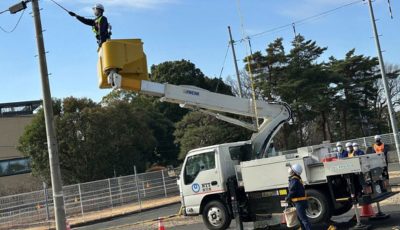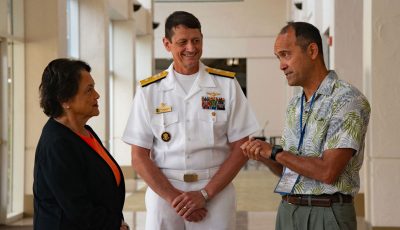RICK’S COLUMN
Taiwan, the Republic of China, or ROC
Marianas Islanders understand the importance of building relationships with other peoples, places, and organizations. This is exemplified in part, with recent action taken by Guam lawmakers who passed a resolution in support of Taiwan’s desire to obtain observer status at the World Health Organization’s upcoming 74th annual World Health Assembly. Executive line and autonomous agency officials of the government of Guam are seeking to fully execute a Taiwan-Guam tourist arrival agreement.
All this has taken place while concurrent actions have been taken by Taiwan to both reopen its foreign ministry office in Guam and to donate personal protective equipment to help islanders contain the COVID 19 pandemic.
US-Taiwan relations
Congress passed the Taiwan Assurance Act of 2020 to demonstrate America’s desire to strengthen relations with Taiwan. The United States supports Taiwan’s increased involvement in multinational engagements representing itself as an economic entity, not as a future politically independent nation state.
The United Nations made the 1971 decision to recognize the People’s Republic of China, which resulted in the ROC being placed outside of the purview of the UN. The 1979 implementation of the Taiwan Relations Act by the United States established the basis for America to have an official, unofficial bilateral relationship with Taiwan.
America is not obligated to defend Taiwan under the Taiwan Relations Act, yet Taiwan purchases billions of dollars of American military equipment to better enable its government to defend itself from a possible attack by mainland China.
China and Taiwan remain at odds on ideas of what constitutes nationalism and sovereignty. China views Taiwan as its own and continues maritime patrol operations near the island while the United States remains ever present through maritime transit operations in the Taiwan Strait.
Economic interdependencies
Taiwan is a fully integrated export-driven economy centrally involved in supply chain economics. China is Taiwan’s biggest export market. Taiwan and the United States have established relationships in service, industrial, agricultural, pharmaceuticals, and semiconductor trade, foreign exchange holdings and related direct investment.
Guam leaders going the right direction
Government of Guam lawmakers and the governor are walking down the right strategic path toward economic diversification through its whole-of-insular government approach with Taiwan. Taiwan’s economy is over 100 times the size of Guam’s economy from a gross domestic/insular product and service point of view, making Taiwan an ideal long-term partner for the island.
Northern Marianas leaders going the right direction
Northern Marianas Islands leaders have also made the right decision to reestablish relations with Taiwan last month by restarting representative office operations. The NMI and Taiwan have forward opportunities to find new and creative ways to work together to broaden and diversify their respective economies.
Taiwan would be an ideal partner for the Northern Marianas on infectious disease studies and disease monitoring training because of all the work Taiwan has done on this front. Taiwan and the Northern Marianas would also find benefit with pursuing possible student, professional, or aviation-related exchange programs.
How ambiguity becomes clarity in narrowly defined colonized spaces
Taiwan is a fledgling democracy that is biased in ways that favor American-style politics. Taiwan has led the way in providing readily accessible exercise facilities to help keep its population healthy, it maintains a world-class medical health affairs care delivery system and sustains a robust media.
Yet these pockets of excellence operate within broader grey zone of colonized political realities. The United States maintains an official position of ambiguity when it comes to its relations with Taiwan. America’s policy on Taiwan is intended to deter China from attacking Taiwan. It is also a policy that dissuades Taiwan from declaring itself to be politically independent by framing the island as a sound and prosperous economic entity.
If Taiwan came under attack, America’s long-term credibility in the region will be tested. If the U.S. provides some military support that results in clear losses or a stalemate, allies such as Japan, South Korea, and the Philippines might pause or gravitate closer into China’s geopolitical orbit. Guam and the NMI would be further reinforced militarily as a key logistical and launching point for war, posing existential threats to our ancient Pacific Islander civilization.
Similarities between Taiwan and the Marianas Islands
Guam, the Northern Marianas, and Taiwan face a similar kind of policy predicament driven by the geopolitical underbelly of American self-interests of maintaining strategic political ambiguity.
The United States euphemistically refers to Guam as “America in Asia,” or “where America’s day begins” or borrows label names that divert or conceal the deeper colonial underpinnings and power imbalances that have been in place between the ancient Chamorro people of our Marianas Islands and the American administering power.
U.S. policy toward Taiwan and the Mariana Islands represents at its core an amalgamation of three fundamental constructs. First, there is the desire to secure and maintain total advantage for all things military and intelligence related. Second, there is a desire to enable Pacific Islanders and Taiwanese to pursue economic growth opportunities in ways that do not conflict with American military or national interest objectives. Lastly, both Taiwan and the Marianas are intended by the United States to remain in a clearly unclear political end-state so that no further perceived disruptions and uncertainties will prevent America from delivering hard and soft power capabilities throughout the region. This is fundamentally wrong at many levels.
What must not go unnoticed is that the need to further diversify the economies of our Mariana Island chain is founded on the presupposition that the core utility of our ancient blue ocean continent space to the United States is founded on the maintenance, growth, and total freedom of action across all domains, while shaping the hearts and minds of our ancient Chamorro people and other Pacific Islander civilizations throughout Micronesia. This is also fundamentally wrong.



























